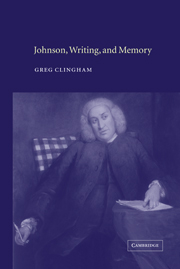Book contents
- Frontmatter
- Contents
- Acknowledgments
- List of abbreviations
- Introduction: Johnson and authority
- 1 Johnson and memory
- 2 Johnson and nature
- 3 Law, narrative, and memory
- 4 Narrative, history, and memory in the Lives of the Poets
- 5 Translation and memory in the Lives of the Poets
- 6 Historiographical implications
- Notes
- Bibliography
- Index
3 - Law, narrative, and memory
Published online by Cambridge University Press: 22 September 2009
- Frontmatter
- Contents
- Acknowledgments
- List of abbreviations
- Introduction: Johnson and authority
- 1 Johnson and memory
- 2 Johnson and nature
- 3 Law, narrative, and memory
- 4 Narrative, history, and memory in the Lives of the Poets
- 5 Translation and memory in the Lives of the Poets
- 6 Historiographical implications
- Notes
- Bibliography
- Index
Summary
On the morning of Tuesday 17 June 1783, Johnson (in his 73rd year) awoke to discover that he had suffered a stroke and had been deprived of the power of speech. He wrote the following note to his neighbour, Edmund Allen:
Dear Sir,
It hath pleased Almighty God this morning to deprive me of the powers of speech; and as I do not know but that it might be his further good pleasure to deprive me soon of my senses, I request you will, on receipt of this note, come to me, and act for me, as the exigencies of my case might require. I am sincerely your's,
Sam JohnsonThere is something iconic about this moment in Johnson's life: it tells of a long series of afflictions, both mental and physical; it tells of his courage in facing a death that always troubled him; and it tells of his wry humour – for a few days later (19 June 1783) he described the stroke to Hester Thrale by writing: “I was alarmed, and prayed God, that however he might afflict my body he would spare my understanding. This prayer, that I might try the integrity of my faculties I made in Latin verse. The lines were not good, but I knew them not to be very good, I made them easily, and concluded myself to be unimpaired in my faculties” (Letters, IV, 151).
- Type
- Chapter
- Information
- Johnson, Writing, and Memory , pp. 60 - 88Publisher: Cambridge University PressPrint publication year: 2002
- 1
- Cited by



